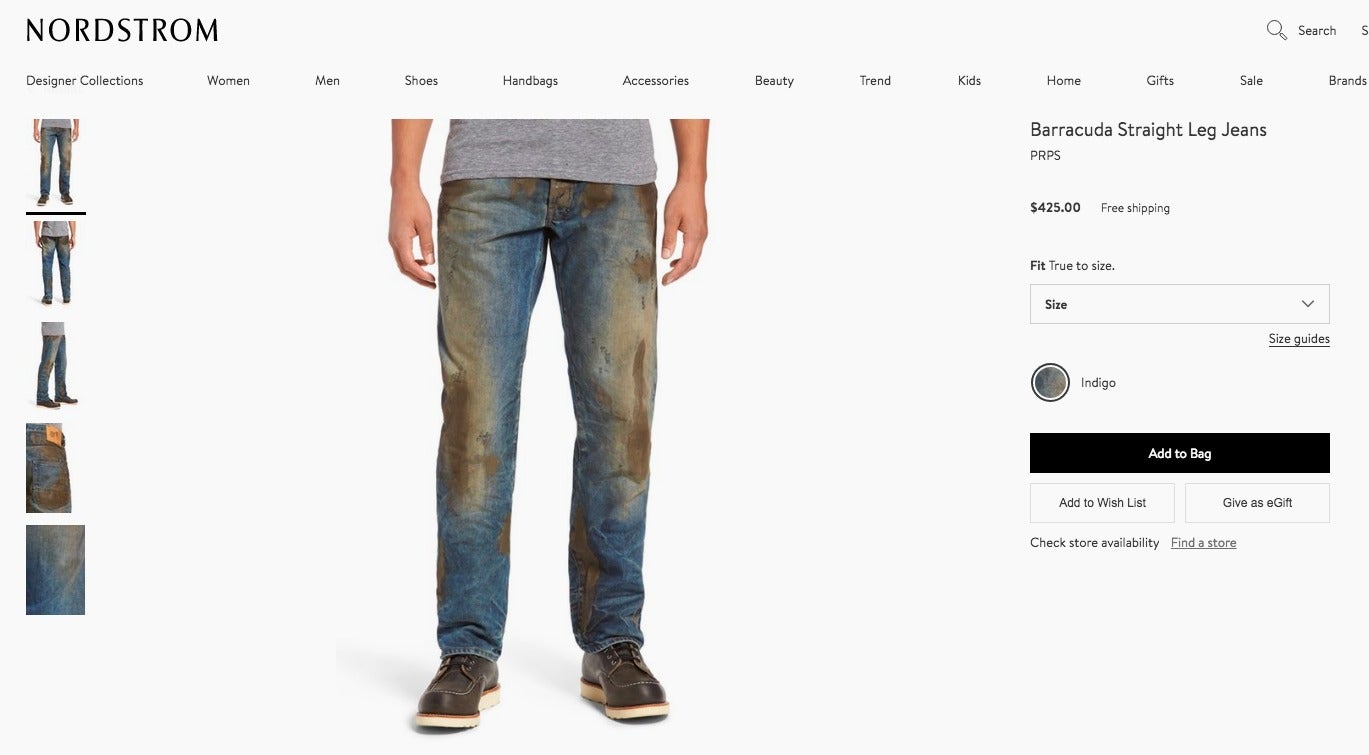A $425 pair of pre-muddied jeans has become an emblem of the US’ “war on work”
Since US president Trump won the 2016 election with a campaign vowing to resurrect US manufacturing, you can’t shop at Nordstrom, lace up a pair of New Balance sneakers, or consider L.L. Bean duck boots without the act feeling somehow politically charged. A pair of jeans is now joining the list—in particular, a pair of distressed, faux mud-caked jeans, on sale at luxury department store Nordstrom’s website for $425.


Since US president Trump won the 2016 election with a campaign vowing to resurrect US manufacturing, you can’t shop at Nordstrom, lace up a pair of New Balance sneakers, or consider L.L. Bean duck boots without the act feeling somehow politically charged. A pair of jeans is now joining the list—in particular, a pair of distressed, faux mud-caked jeans, on sale at luxury department store Nordstrom’s website for $425.
Mike Rowe, former host of TV show “Dirty Jobs,” calls the jeans an example of what he and other voices on the political right see as a “war on work.” ”This morning, for your consideration, I offer further proof that our country’s war on work continues to rage in all corners of polite society,” he wrote in an April 24 post on his site. “Behold the latest assault from Nordstrom’s. The ‘Barracuda Straight Leg Jeans.'”
He continued, lambasting the “illusion” of work and effort behind the jeans: “Finally – a pair of jeans that look like they have been worn by someone with a dirty job…made for people who don’t. And you can have your very own pair for just $425.00.” (The show Dirty Jobs explored the unpleasant work behind-the-scenes that makes a lot of the sanitized conveniences of modern life possible.)
The jeans, by label PRPS, were widely mocked online, and attracted widespread media coverage. Last night, Rowe appeared on Fox News’ “Tucker Carlson Tonight,” where he said Carlson had asked him to keep a lookout for examples of the “war on work,” according to WWD (paywall).
The phrase “war on work” has become shorthand for the idea that the US has forgotten how to value actual hard work. It has taken on different shades of meaning over time: In 2014, Fox News announced that Democrats had declared war on work, arguing that government subsidies discouraged poor people from getting jobs. Rowe’s accusation has more to do with what he sees as Americans’ reluctance to take highly-trained blue-collar work. Tied up in lamentations about work in the US are concerns about the ways outsourcing and automation have eliminated manufacturing jobs.
Somewhat ironically, PRPS’ founder, Donwan Harrell, launched the label to recreate what he saw as authentic American denim. Modern blue jeans were effectively invented in the US (by a Bavarian immigrant named Levi Strauss, but that’s a separate matter). For much of the 20th century, America produced the world’s best denim, woven on narrow shuttle looms. Eventually, though, American denim brands moved on to faster, more cost-effective methods of production that resulted in a textile that didn’t feel or wear the same.
Japanese brands, however, became obsessed with recreating “real” American jeans, leading to a cottage industry producing old-style selvedge denim. Harrell discovered it while working for Nike in Asia, and became one of the first to bring this American Japanese denim back to the US. The label developed a following that loved the authenticity of it—which didn’t come cheap—down to the careful distressing and finishings that reproduced the signs of real work on the jeans.
We have reached out to PRPS for comment and will update this post with any reply.